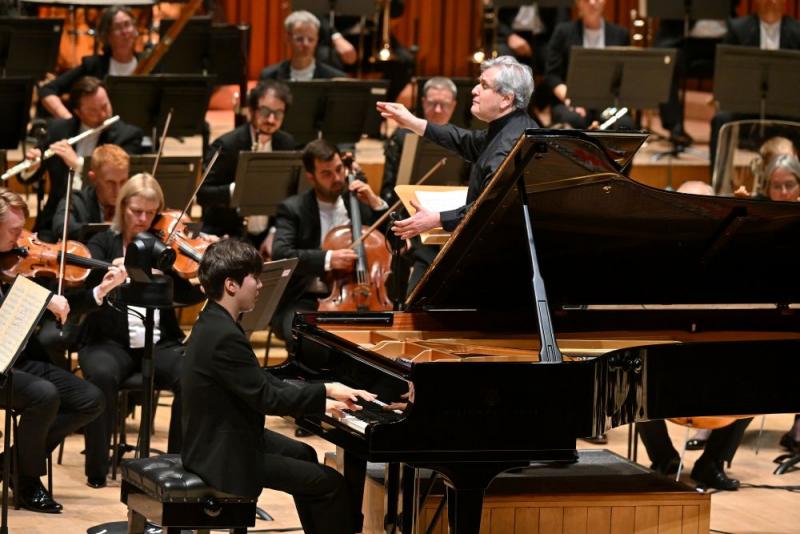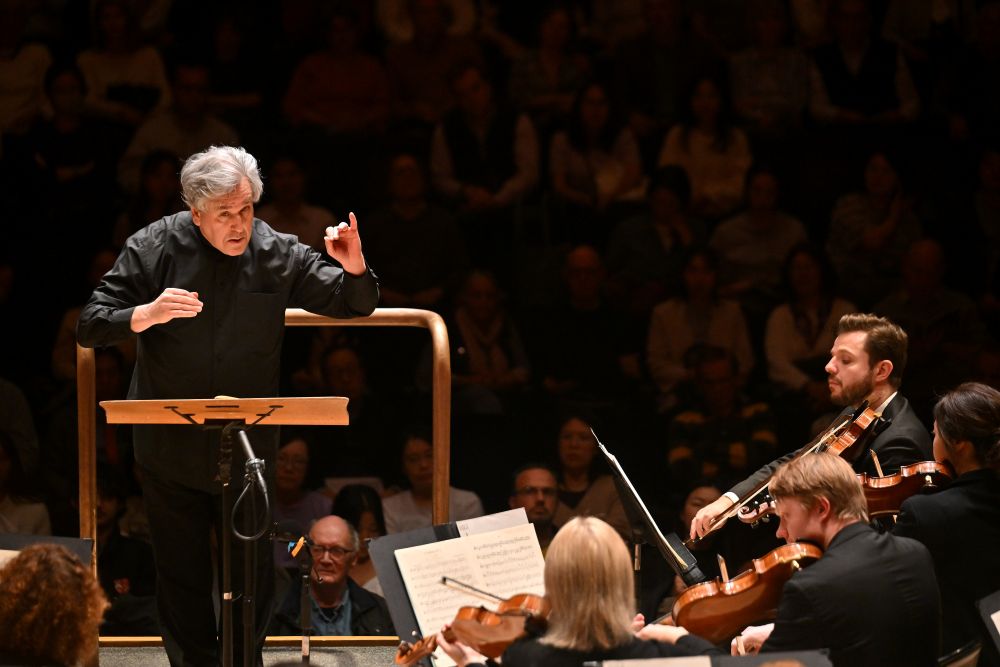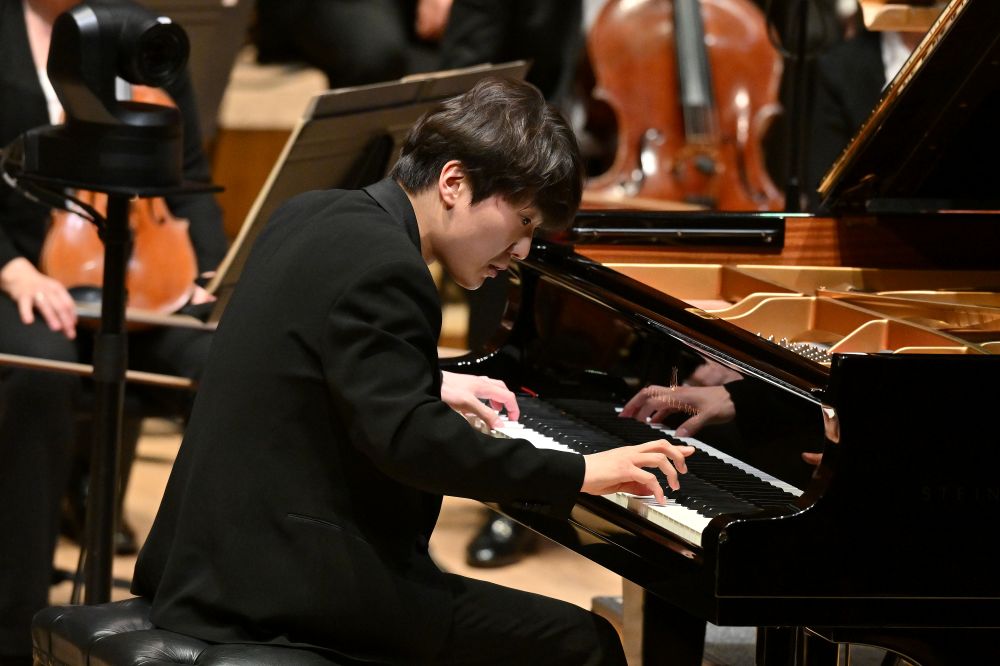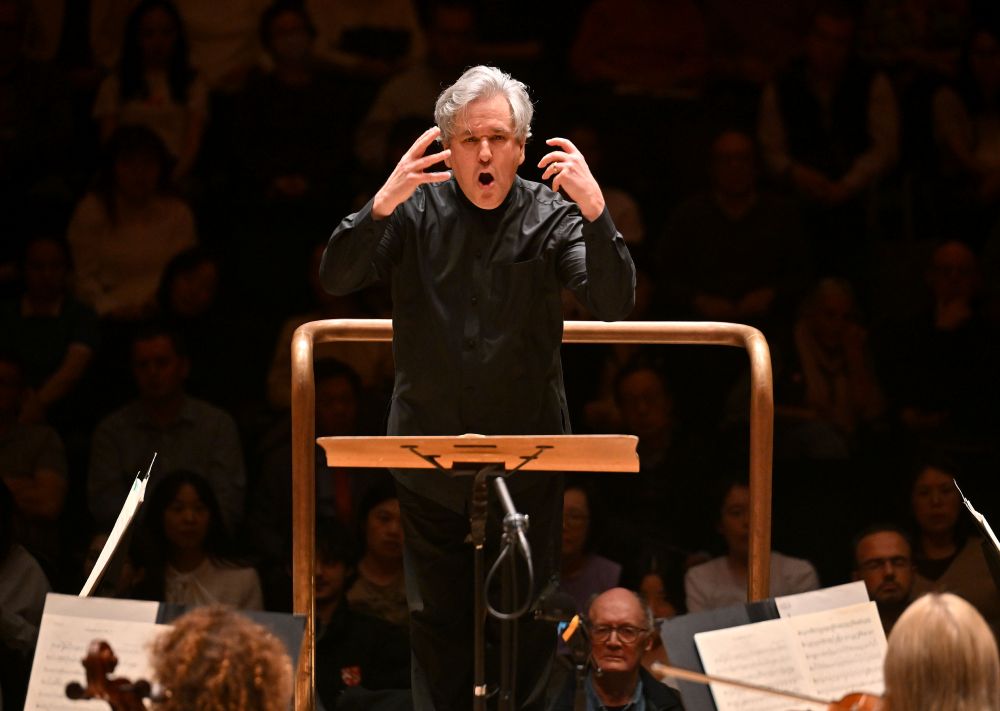Cho, LSO, Pappano, Barbican review - finely-focused stormy weather | reviews, news & interviews
Cho, LSO, Pappano, Barbican review - finely-focused stormy weather
Cho, LSO, Pappano, Barbican review - finely-focused stormy weather
Chameleonic Seong-Jin Cho is a match for the fine-tuning of the LSO’s Chief Conductor

It was a hefty evening, as it needn't necessarily have been throughout, since Shostakovich’s Ninth Symphony can conceal more darkness between the lines in a lighter take. In his second full concert of his second season as the wildly successful and popular Chief Conductor of the London Symphony Orchestra, Antonio Pappano spared us none of the hard-hitting.
Nor did the phenomenal pianist Seong-Jin Cho in Prokofiev’s colossal Second Piano Concerto, drawing as usual crowds of his fellow South Koreans. It was neither Pappano's nor Cho's fault if I’d recently heard interpretations of that and Beethoven’s Fifth more to my own taste.
Playing-wise, the articulation of Shostakovich’s shorter symphony between two more monuments, the Eighth and the Tenth, was supreme: enough to have put it at the top of the list as a recording when I compared all versions of the Ninth for BBC Radio 3’s Building a Library. What I observed there, though, was that Shostakovich didn't like his second movement, marked Moderato, taken too slowly - he told Koussevitzky so - and treating it as a slow movement, like Pappano, risks losing its essential character as a limping waltz. Still, the evening's first tranch of woodwind soloists - it's a splendid kind of showing-off that Pappano can field a second, equally good team, whom we heard in the Beethoven - was hauntingly led by clarinettist Sérgio Pires.  Before that, the neoclassical opening of the Allegro con brio quickly turned beefy, and while the conductor is a master of continuity, there was spacious panache around the insistent trombone (Simon Johnson) pompously announcing the second theme (on piccolo, as it turns out).
Before that, the neoclassical opening of the Allegro con brio quickly turned beefy, and while the conductor is a master of continuity, there was spacious panache around the insistent trombone (Simon Johnson) pompously announcing the second theme (on piccolo, as it turns out).
Bassoonist Rachel Gough announced her tragic solos in the Largo following a biting, scary Scherzo as a human cry of pain, a risk worth taking. The finale gathered steam but the madcap dash at the end wasn't quite as hair-raising as it can be (in another connection, deliberate or not, we got the same in genuinely triumphant mode, at the end of the Beethoven - a real clincher to conclude the concert).
I first heard Seong-Jin Cho in the 2023 Proms playing Chopin's First Piano Concerto, a work which can seem palely pretty, but which here was a miracle of pearly gorgeousness, profound in itself. Prokofiev's Second is at the other end of the scale, a monster in every way, not least notewise (the cadenza which takes up the development of the first movement spreads on to three staves in the score).  After the melancholy melody of the start, Cho was determined to show us he can do the weight with fullest clarity, but I was still hooked on Igor Levit's interpretation six months ago, flying through the darkness. Where Cho truly stuns is in the quirkily-accented dances over the abyss, which made the third-movement variations on a dinosaur's back the individual highlight of a never less than impressive performance. He also moved from expressive physicality to absolute poise in the calm theme which unexpectedly emerges in the finale. Around him the orchestra sent out more clearly-defined shards of glass than I've ever heard in this work. The encore, Ravel's À La Manière De Borodine (yes, its identity stumped me), returned us to the humane stillness of Prokofiev's last theme in the concerto.
After the melancholy melody of the start, Cho was determined to show us he can do the weight with fullest clarity, but I was still hooked on Igor Levit's interpretation six months ago, flying through the darkness. Where Cho truly stuns is in the quirkily-accented dances over the abyss, which made the third-movement variations on a dinosaur's back the individual highlight of a never less than impressive performance. He also moved from expressive physicality to absolute poise in the calm theme which unexpectedly emerges in the finale. Around him the orchestra sent out more clearly-defined shards of glass than I've ever heard in this work. The encore, Ravel's À La Manière De Borodine (yes, its identity stumped me), returned us to the humane stillness of Prokofiev's last theme in the concerto.
Pappano's Beethoven Fifth was high, lucid and bright. Terrific rhythmic definition, outstanding work from the first two of the four horns and a thunderous kickoff /underpinning of the fugato passage in the Scherzo from the double basses (now reduced, but not substantially, from eight to six) gilded the excitement.  There was also ravishing soft playing in the transitions of the Andante con moto and from the beautifully-dimmed recap of the scherzo to the start of the build to the finale. For me, though, the excellent bowed to the memory of the electrifying, when the Luigi Cherubini Youth Orchestra got to play its first Beethoven Five under the baton of a galvanised Riccardo Muti. It may well be my personal problem that I ask myself "why" in the second and last movements, and my delight that Muti's swift tempi temporarily solved that problem. Pappano's take was a remarkable one, all the same, with first-rate playing throughout.
There was also ravishing soft playing in the transitions of the Andante con moto and from the beautifully-dimmed recap of the scherzo to the start of the build to the finale. For me, though, the excellent bowed to the memory of the electrifying, when the Luigi Cherubini Youth Orchestra got to play its first Beethoven Five under the baton of a galvanised Riccardo Muti. It may well be my personal problem that I ask myself "why" in the second and last movements, and my delight that Muti's swift tempi temporarily solved that problem. Pappano's take was a remarkable one, all the same, with first-rate playing throughout.
rating
Share this article
The future of Arts Journalism
You can stop theartsdesk.com closing!
We urgently need financing to survive. Our fundraising drive has thus far raised £49,000 but we need to reach £100,000 or we will be forced to close. Please contribute here: https://gofund.me/c3f6033d
And if you can forward this information to anyone who might assist, we’d be grateful.

Subscribe to theartsdesk.com
Thank you for continuing to read our work on theartsdesk.com. For unlimited access to every article in its entirety, including our archive of more than 15,000 pieces, we're asking for £5 per month or £40 per year. We feel it's a very good deal, and hope you do too.
To take a subscription now simply click here.
And if you're looking for that extra gift for a friend or family member, why not treat them to a theartsdesk.com gift subscription?
more Classical music
 Cho, LSO, Pappano, Barbican review - finely-focused stormy weather
Chameleonic Seong-Jin Cho is a match for the fine-tuning of the LSO’s Chief Conductor
Cho, LSO, Pappano, Barbican review - finely-focused stormy weather
Chameleonic Seong-Jin Cho is a match for the fine-tuning of the LSO’s Chief Conductor
 Appl, Levickis, Wigmore Hall review - fun to the fore in cabaret and show songs
A relaxed evening of light-hearted fare, with the accordion offering unusual colours
Appl, Levickis, Wigmore Hall review - fun to the fore in cabaret and show songs
A relaxed evening of light-hearted fare, with the accordion offering unusual colours
 Lammermuir Festival 2025, Part 2 review - from the soaringly sublime to the zoologically ridiculous
Bigger than ever, and the quality remains astonishingly high
Lammermuir Festival 2025, Part 2 review - from the soaringly sublime to the zoologically ridiculous
Bigger than ever, and the quality remains astonishingly high
 BBC Proms: Ehnes, Sinfonia of London, Wilson review - aspects of love
Sensuous Ravel, and bittersweet Bernstein, on an amorous evening
BBC Proms: Ehnes, Sinfonia of London, Wilson review - aspects of love
Sensuous Ravel, and bittersweet Bernstein, on an amorous evening
 Presteigne Festival 2025 review - new music is centre stage in the Welsh Marches
Music by 30 living composers, with Eleanor Alberga topping the bill
Presteigne Festival 2025 review - new music is centre stage in the Welsh Marches
Music by 30 living composers, with Eleanor Alberga topping the bill
 Lammermuir Festival 2025 review - music with soul from the heart of East Lothian
Baroque splendour, and chamber-ensemble drama, amid history-haunted lands
Lammermuir Festival 2025 review - music with soul from the heart of East Lothian
Baroque splendour, and chamber-ensemble drama, amid history-haunted lands
 BBC Proms: Steinbacher, RPO, Petrenko / Sternath, BBCSO, Oramo review - double-bill mixed bag
Young pianist shines in Grieg but Bliss’s portentous cantata disappoints
BBC Proms: Steinbacher, RPO, Petrenko / Sternath, BBCSO, Oramo review - double-bill mixed bag
Young pianist shines in Grieg but Bliss’s portentous cantata disappoints
 theartsdesk at the Lahti Sibelius Festival - early epics by the Finnish master in context
Finnish heroes meet their Austro-German counterparts in breathtaking interpretations
theartsdesk at the Lahti Sibelius Festival - early epics by the Finnish master in context
Finnish heroes meet their Austro-German counterparts in breathtaking interpretations
 Classical CDs: Sleigh rides, pancakes and cigars
Two big boxes, plus new music for brass and a pair of clarinet concertos
Classical CDs: Sleigh rides, pancakes and cigars
Two big boxes, plus new music for brass and a pair of clarinet concertos
 Waley-Cohen, Manchester Camerata, Pether, Whitworth Art Gallery, Manchester review - premiere of no ordinary violin concerto
Images of maternal care inspired by Hepworth and played in a gallery setting
Waley-Cohen, Manchester Camerata, Pether, Whitworth Art Gallery, Manchester review - premiere of no ordinary violin concerto
Images of maternal care inspired by Hepworth and played in a gallery setting
 BBC Proms: Barruk, Norwegian Chamber Orchestra, Kuusisto review - vague incantations, precise laments
First-half mix of Sámi songs and string things falters, but Shostakovich scours the soul
BBC Proms: Barruk, Norwegian Chamber Orchestra, Kuusisto review - vague incantations, precise laments
First-half mix of Sámi songs and string things falters, but Shostakovich scours the soul
 BBC Proms: Alexander’s Feast, Irish Baroque Orchestra, Whelan review - rapturous Handel fills the space
Pure joy, with a touch of introspection, from a great ensemble and three superb soloists
BBC Proms: Alexander’s Feast, Irish Baroque Orchestra, Whelan review - rapturous Handel fills the space
Pure joy, with a touch of introspection, from a great ensemble and three superb soloists

Add comment